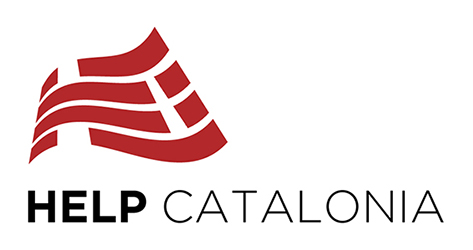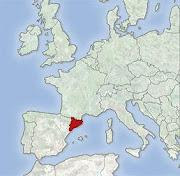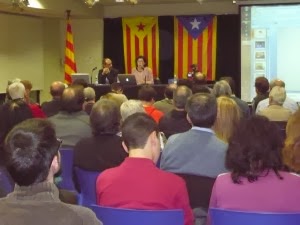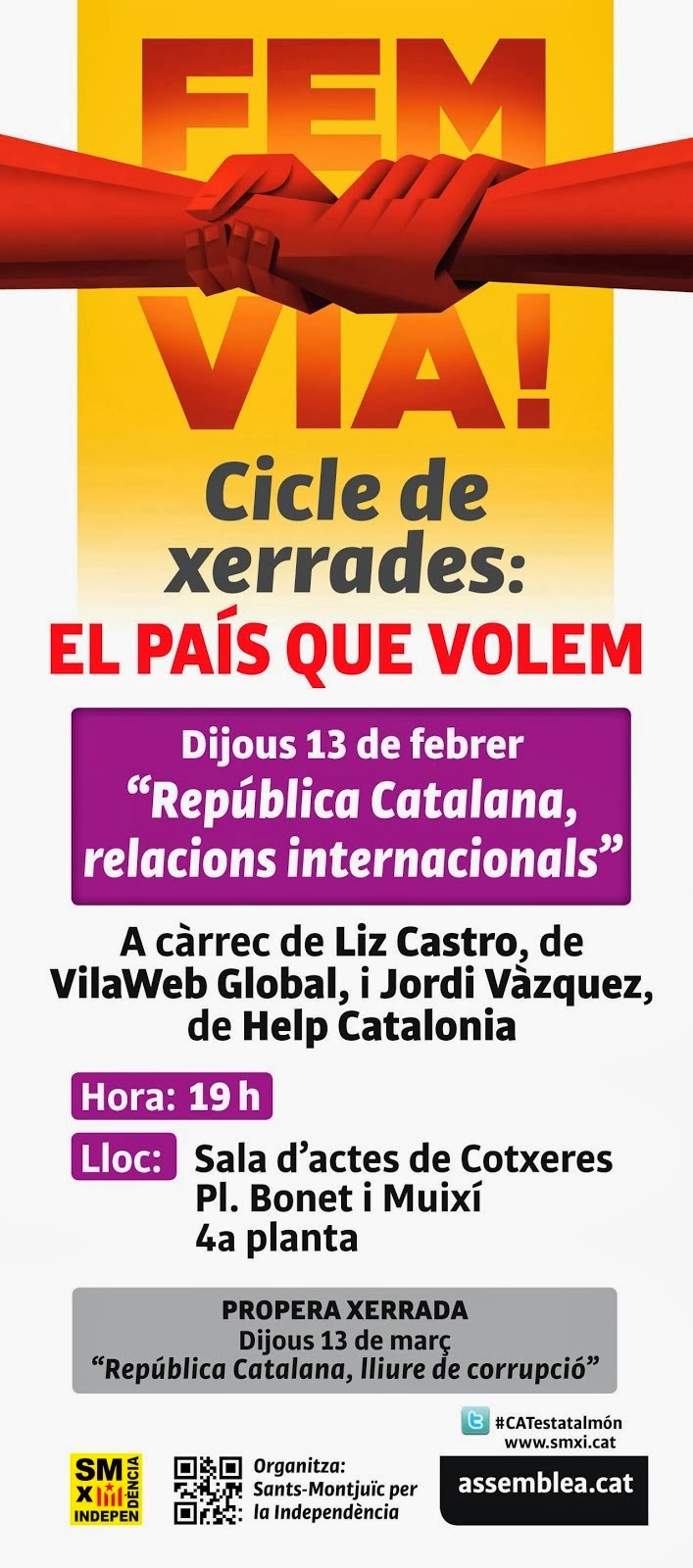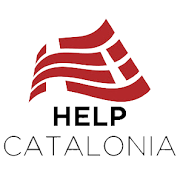The Catalan National Assembly, a civic umbrella group working for
a referendum in Catalonia, conquered by force of arms by Spain in 1714, held a
fourth talk on post-independence foreign policy, within “The Country We Want”
series. The two speakers were Liz Castro, American-born, originally from
California, who has helped to make Catalonia known to the world, writing a
number of books and articles in English. She currently serves as coordinator of
online newspaper Vilaweb's
English-language edition.
Jordi Vazquez, a business graduate, is the editor of Help Catalonia, a private entity devoted to public diplomacy.
He has a long curriculum working to inform the world about Catalonia's freedom
movement. Over a couple of hours, Vàzquez and Castro discussed how to work to
ensure the speedy recognition of independent Catalonia, also going over other
issues such as the role of civil society in public diplomacy and how to ensure
Catalans abroad are not denied their right to vote.
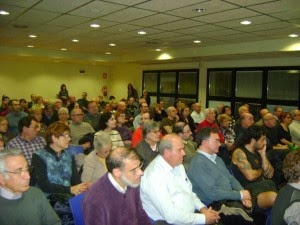
Liz
Castro: Catalonia has powerful cards up her sleeve to negotiate with the EU.
Following
the presentation of the two speakers, Liz Castro opened the event, explaining
how at first her purpose had been to inform her friends and acquaintances about
what was going on in Catalonia. She stressed how the news circuit, often going
through Madrid, made it difficult for events in Catalonia to reach
international audiences.
She then
next referred to Catalonia's economy, equivalent in size to that of Finland,
which makes it impossible for Catalonia to be excluded from Europe.
Furthermore, the current euroskeptic wave makes it even less likely for the EU
to try to exclude Catalonia, a net contributor to Brussel's budget. In
addition, the more than 3,500 foreign companies in Catalonia constitute an
added powerful voice to defend continued EU membership.
Castro also
discussed the intoxications one often finds in the media. As an example, she
cited the “Barcelona
Declaration”, which at
first seemed to have been signed by more than 50 powerful German businessmen
allegedly against the coming referendum, but that was quickly disowned by BASF.
Also significant were the recent words of Josep Oliu, Bank Sabadell chairman,
saying that although he personally did not expect Catalonia to recover
independence, it should not be a problem for his bank. The third example was
the claim by Jaime Malet, chairman of the American Chamber of Commerce in
Spain, who said that many American enterprises were worried, only to be
immediately corrected the following day by US
Ambassador to Spain James Costos, who said that no companies were worried about
this.
According
to Castro, Madrid is not free to do what she wants, due to her huge national
debt. The debt is also important because, if Madrid wishes Barcelona to take up
a portion, then she must open negotiations with Catalonia. Should Spain fail to
recognize Catalonia, then Catalonia would not be bound to re-pay any part of
the former's national debt. Castro next discussed the different European
institutions and organizations, and the euro, and Catalonia's prospects for
continued membership. While noting that it was by no means a foregone
conclusion that Catalonia would be excluded from the EU, she stressed how
countries like Norway or Switzerland did not belong to the Union and this was
no bar to a very high standard of living. She also explained how European law
did not provide for German reunification, and this was no obstacle for
immediate East-German membership once the two Germanies had reunited. It was
then, and it is now, basically a matter of finding political solutions.
Concerning
recognition, Castro explained that no state would speak out about Catalonia
until a referendum had been held. Then, once Catalans had voted, foreign
governments would follow suit. She then proceeded to describe what, for her,
were Catalonia's outstanding characteristics. She emphasized the importance of
small and medium-sized enterprises, the high degree of solidarity (as clear in
the yearly TV3 television fund-raising marathon), and the strength of civil
society, which has pushed forward a peaceful independence process. Being a
small country can also be an advantage, since they tend to work better than
bigger entities.
Jordi
Vàzquez: 'We must fight to gain recognition by the 193' UN member states
Vàzquez
opened his address stressing the importance of Sants, together with Gracia, two
of Barcelona's most active districts, and thanking them for their role in
promoting the independence movement within Catalonia's capital. He then
explained the significance of recognition by other countries, stressing that
some states had proclaimed independence yet failed to gain recognition.
Northern Cyprus and Abkhazia were among the examples he cited. Thus, “what we
must fight for, and this why we set up Help Catalonia, is to gain recognition
by the 193” UN member states. According to Vàzquez, “many of us are no longer
Spanish”, having mentally broken away from Spain, and therefore now the time
has come to declare independence and to get other countries to recognize us as
no longer Spaniards. Taking into account all examples of unrecognized states,
making Catalonia known around the world is essential. Following the Spanish
Civil War, Catalonia disappeared from the maps. Furthermore, Madrid worked hard
to ensure that this remained so. It was a “silent war”, a strategy where one
tries to silence one's enemy. This is the “silent war” against which Help
Catalonia was created. The goal was “to make friends, find allies”, so that
“the Catalan Republic is recognized by these friends”. Vàzquez stressed the
need for Catalonia to have relations with all countries in the world, no matter
what their nature was. Normal countries have embassies everywhere, “Iran, North
Korea, everywhere”. Thanks to Help Catalonia, foreign journalists have an
alternative view on the table, media outlets like the BBC can now get
information direct from Catalonia. They no longer have to exclusively rely on
Madrid, Help Catalonia speaks their language, English. Furthermore, Help
Catalonia not only communicates in English, it uses the terminology of the international
media. As an example, Help Catalonia has succeeded in labelling Spanish
nationalists as “unionists”, and acts of political violence against Catalonia
as “terrorism”.
Vàzquez
explained how Help Catalonia did not emphasize the tax plunder of Catalonia,
since this is something that other countries do not care about. Instead, Help
Catalonia explains how Spain is trying to prevent Catalans from voting, which
is something that no democrat can ignore. It also informs about Spain's
wasteful economic policies, using subsidies from the EU to, among others, build
huge embassies and trains to nowhere. Help Catalonia also informs the world's
defence and security think-tanks about Spain's failure to do her duty as a NATO
member, acting like a security consumer and not a security provider.
Now it is
the time for Catalan civil society to devote her efforts to public diplomacy,
instead of relying on the Catalan Government, Vàzquez stressed. This is
necessary for a number of reasons. First, to avoid accusations that the
independence movement was government-directed, instead of a grass roots
development. Second, because the Catalan Government could be accused of wasting
resources if it spent much on diplomacy while being forced to implement cuts in
health care and education. Third, in order to bypass the legal limitations
under which it labours when acting abroad, which the Spanish regime is trying
to tighten even further.
Vàzquez
then outlined the origins and the work of Help Catalonia, stressing that it
operated in a number of languages, including not only English but also French,
German, and Spanish. It is staffed by volunteers, based all over the world. In
addition to directly informing about events in Catalonia, Help Catalonia has
often assisted media outlets interested in conducting interviews or filming
documentaries in Catalonia. Volunteers do not receive any kind of compensation.
Help Catalonia has also conducted a number of events, including a guided visit
to Catalonia's Parliament, where lawmakers had the chance to explain the
mediaeval origins of the institution to a group of foreign journalists. Another
guided visit took place last year, on the occasion of Catalonia's 11 September
National Day, when a dinner with foreign journalists was held.
Help Catalonia
has cooperation agreements with other organizations, like the Catalan Business Circle. Since, “unfortunately some people do not read
much,” Help Catalonia also designs infographs and multimedia guides, which are
spread in the social media, reaching a lot of people. While Help Catalonia
denounces Spanish nationalism, including violent threats and Nazi propaganda,
it also seeks to put forward a positive message, welcoming developments like
Monarch Airlines' Catalan-language website, and informing about attractive episodes of
Catalan history like Pau
Casal's UN address. While
in the past, many Spanish nationalist deeds went unnoticed in Europe and the
wider world, in recent years Catalans have started to systematically denounce
policies like government
subsidies for the Francisco Franco Foundation, which Madrid funds.
Vàzquez
concluded his address stressing that it was other organizations' job to win the
referendum, while Help Catalonia's was to contribute to gaining international
recognition for the new state.
Who will
recognize Catalonia first? Both speakers were asked to give their opinion on who would likely
recognize Catalonia first. Castro believes that recently-independent countries
like the Baltic Republics could be the first, and that the United States, which
favours stability, would follow. Vázquez believes that Scandinavian countries
will immediately recognize Catalonia, and that countries opposed to Spain will
follow suit. An example is the United Kingdom, which would have easily
recognized Catalonia if she had declared independence last summer, while
Gibraltar was suffering a blockade. He also explained that Help Catalonia had a
number of volunteers in Gibraltar, and that relations between Catalonia and the
Rock were excellent. Israel is clearly in favour of Catalonia. Russia is
traditionally more reluctant, but Putin seems to be shifting. African countries
will probably wait and see what Western powers do, while South American
countries and Portugal seem reluctant to date.
Other
Questions.
One of the
attendants asked Jordi Vàzquez whether Help Catalonia sought to engage ordinary
citizens abroad. He explained how it very much did so, and how over the years
they had received expressions of support from myriad countries. As time goes
by, Spanish aggressions increasingly go unchallenged. An example he provided
was a Filipino citizen who, on reading about Spain's attempts to stamp out
Catalan from schools, wrote to Help Catalonia and sent pictures taken during
the colonial period showing how Spanish authorities had imposed their language
in the islands by force.
Another
question to Vàzquez and Castro concerned the position of countries not
mentioned earlier. In his reply, Vàzquez explained how France, which five years
ago was rather reluctant toward Catalan independence, had now become neutral or
even leaning towards recognition. Contacts with Quebec have helped, as have
visits by French journalists to Catalonia.
Castro referred to Canada, explaining that Otawa was clearly in favour
of Catalonia's referendum, in accordance with her strong democratic tradition.
A member of
the public asked about the role of different Catalan entities and associations
in public diplomacy. Vàzquez explained how Help Catalonia cooperated with a
number of associations, including Catalan centres in many cities like London.
Castro stressed the significance of Catalan centres abroad in helping to adapt
one's narrative to each country, stressing those issues that could better
connect with local public opinion. This led to the issue of the right to vote
of Catalans abroad in the coming referendum, in danger from Madrid's grip over
the election system to date. In the past, many Catalans have been de facto
deprived of their right to vote, and Vàzquez stressed the need to work hard to
ensure this did not happen again.
A question
concerned the influence on the United States of a Israeli decision to recognize
Catalan independence. Castro explained that Israel's recognition could have a
significant impact on the United States, while Vàzquez added that the impact
extended to many other countries as well. He also explained that Israel had
already treated Catalan Prime Minister Mas as a head of state, and that her
ambassador to Spain had visited the Born Cultural Centre and learned about the
siege of Barcelona and occupation of Catalonia at the end of the War of Spanish
Succession.
The
roundtable took place at Cotxeres de Sants cultural centre, in Barcelona, at
1900 on the 13th of February 2014. A video of the event is available on line.
Alex
Calvo is an Asian defence and security expert
To know more
